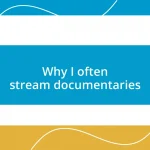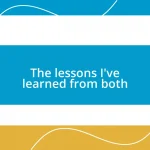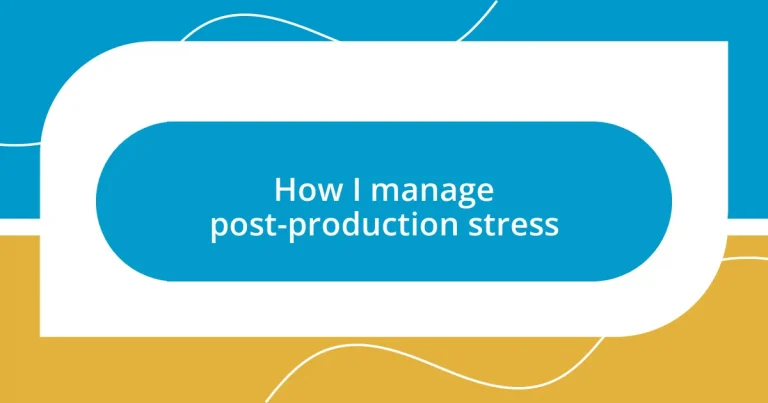Key takeaways:
- Acknowledging and identifying stress triggers, such as tight deadlines and fear of feedback, is crucial for effective stress management during post-production.
- Implementing effective time management strategies, including scheduling breaks and prioritizing tasks, can significantly enhance productivity and well-being.
- Establishing a support network and regularly evaluating progress allows for better collaboration, emotional relief, and continuous improvement in handling post-production stress.
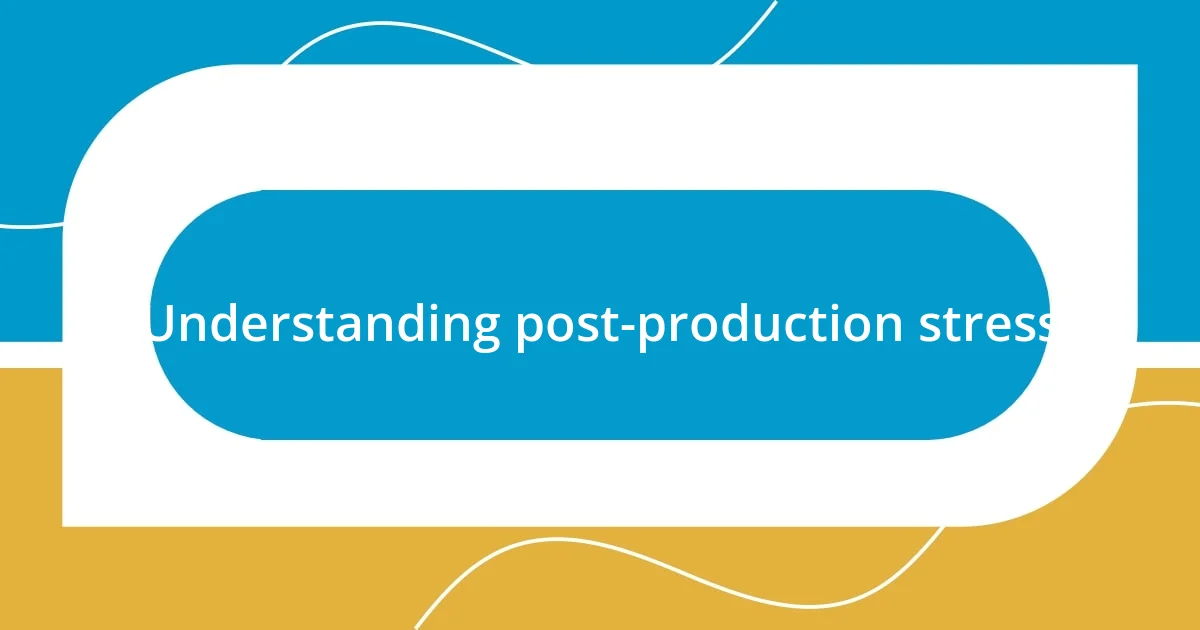
Understanding post-production stress
Understanding post-production stress can be a unique challenge for anyone involved in the creative process. From my experience, it often feels like a relentless pressure cooker; the excitement of creating transforms into anxiety about deadlines and the final product. Have you ever felt that shift—from inspiration to sheer exhaustion? I remember one project where I found myself staring at the same footage for hours, questioning every creative decision I made.
It’s fascinating how our minds work during this phase. While we’re editing, our brains are buzzing with a mix of creative energy and self-doubt. I think it’s important to acknowledge that this stress isn’t just about the workload; it’s deeply tied to our personal desire for perfection. There was a time when I let that need consume me, leading to late nights and overwhelming fatigue. How can we expect our best work when we’re operating on empty?
Moreover, the vulnerability that comes with sharing our final product is another layer of stress. It’s like standing on a stage, revealing your inner world to an audience. I vividly recall premiering a short film that I poured my heart into, only to be hit with anxiety as I awaited reactions. Have you ever felt that mix of pride and fear when presenting your work? It’s essential to understand that these feelings are normal, yet they can be overwhelming if we don’t find healthy ways to cope.
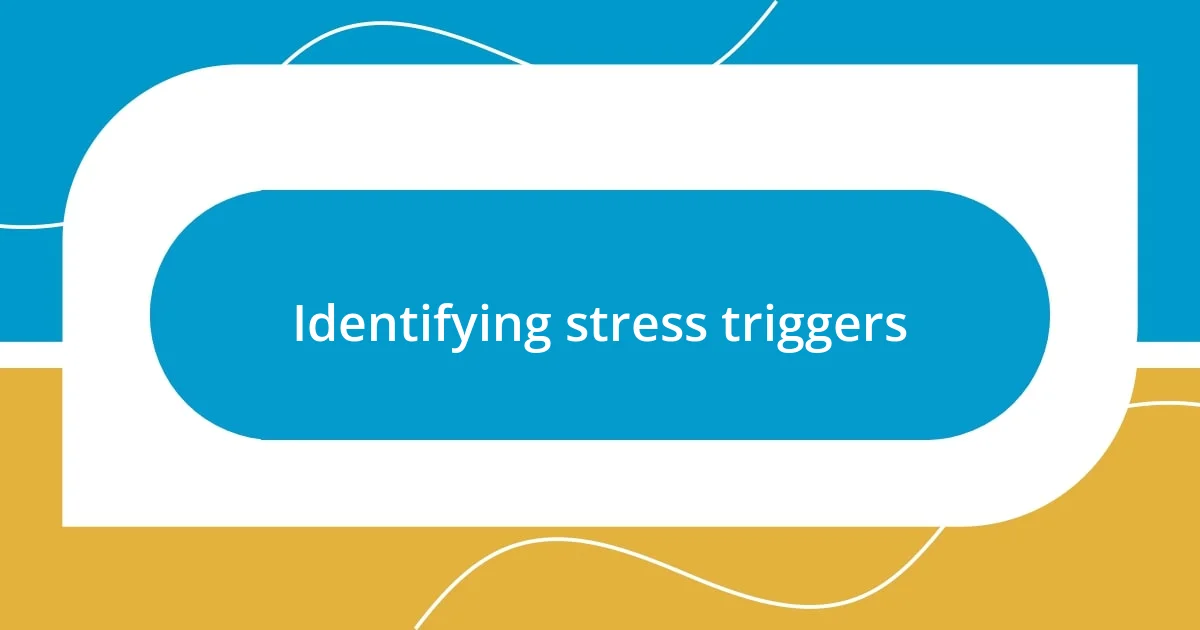
Identifying stress triggers
Understanding what triggers stress during post-production is crucial for maintaining our well-being. For me, tight deadlines often set off a wave of anxiety. I remember one project where I was racing against the clock; my heart would race every time I looked at the calendar. It was as if time itself was conspiring against me. Recognizing that these tight timelines create stress helped me develop a better approach to managing my schedule.
Another stress trigger I’ve observed is the complexity of the tasks involved in post-production. When I’m juggling multiple roles—like editing, sound design, and color correction—it can become overwhelmingly chaotic. I’ve felt that familiar pit in my stomach when realizing I underestimated how long something would take. By identifying this trigger, I learned to break down tasks into more manageable chunks, allowing me to focus without feeling paralyzed by the workload.
Lastly, feedback—or the fear of it—can be a significant source of stress. I’ve had my share of sleepless nights after sending out a rough cut for review, anticipating every possible critique. The uncertainty feels like an emotional rollercoaster. Acknowledging that this fear stems from a deep desire to be accepted and validated helped me put feedback into perspective. It’s part of the process, and understanding that has changed how I approach the review phase.
| Stress Trigger | Personal Experience |
|---|---|
| Tight Deadlines | Felt heart racing as deadlines loomed, creating immense pressure. |
| Complex Tasks | Juggling multiple roles led to chaos and a heavy pit in my stomach. |
| Fear of Feedback | A restless night before reviews, anticipating critiques and hoping for acceptance. |
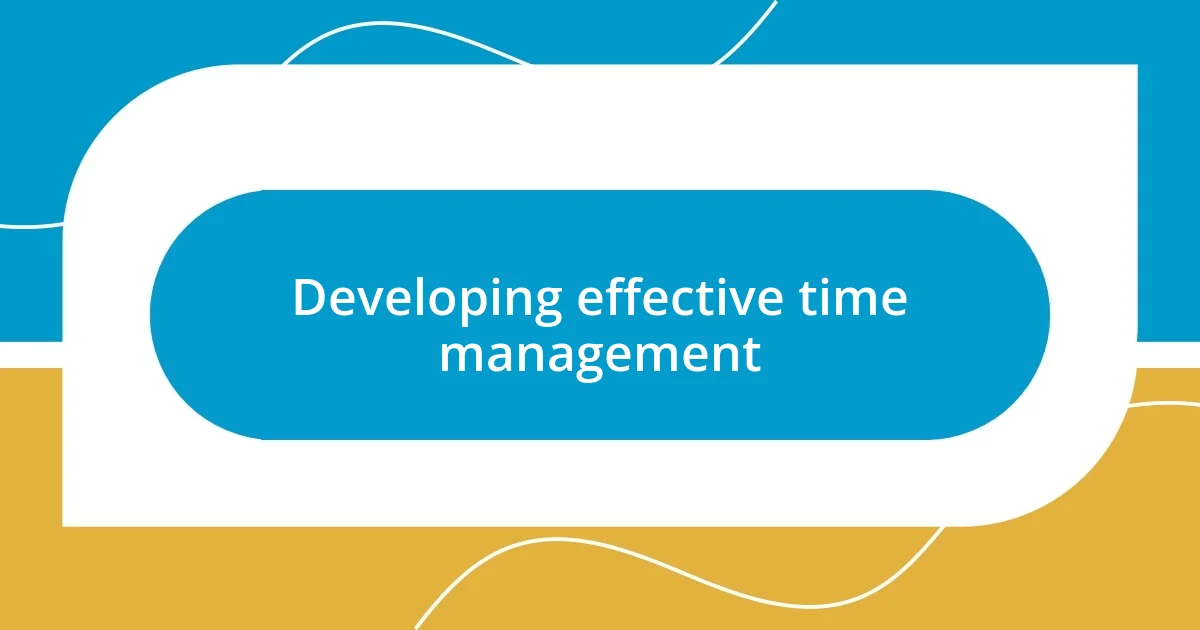
Developing effective time management
Developing effective time management has been a game-changer for me in navigating post-production stress. I discovered that scheduling breaks can significantly enhance productivity. Once, during a particularly demanding editing phase, I decided to set a timer for focused work sessions, breaking my tasks into manageable blocks. This approach not only kept my mind fresh but also prevented burnout, allowing me to maintain my creativity. It’s amazing how a few moments away from the screen can recharge your perspective.
Here are some strategies I’ve found particularly effective:
- Use a calendar: Visualizing deadlines helps me see the bigger picture and avoid last-minute panic.
- Prioritize tasks: Identifying what needs immediate attention versus what can wait alleviates overwhelming feelings.
- Set realistic goals: I learned the hard way that overscheduling only leads to disappointment. By being honest with myself about what I can achieve, I keep stress at bay.
- Incorporate downtime: Even short breaks help recharge my mental batteries, allowing me to return to my work with renewed energy.
- Review weekly: I take time each week to assess my progress and make any necessary adjustments to my plan, keeping me flexible and responsive.
By applying these strategies, I find that I’m not only managing my time more effectively but also improving my overall well-being during the intense post-production phase. It’s a balance that I continually refine, but the journey has been incredibly rewarding.
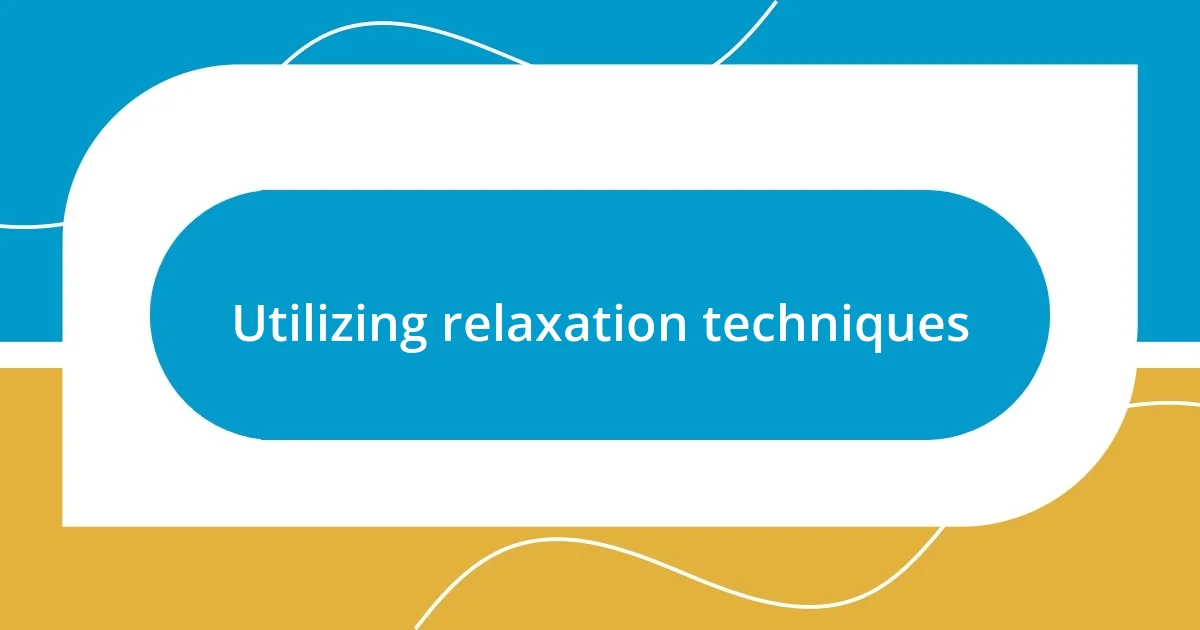
Utilizing relaxation techniques
After identifying stress triggers, I’ve found that incorporating relaxation techniques can be a true lifesaver. One method that resonates with me is mindful breathing. I remember a particularly hectic moment during a project’s final stages when I felt completely overwhelmed. I decided to take a few minutes to focus on my breath. Inhale for four counts, hold for four, and exhale for four—it transformed my mindset almost instantly. Have you ever tried it? The gentle rhythm not only calms the mind but also gives clarity to tackle the next task.
Another technique I’ve embraced is visualization. When I’m feeling stressed, I close my eyes and imagine a peaceful place, like a favorite beach or a quiet forest. During one intense review session when I sensed rising anxiety, I took a moment to picture myself there, smelling the salty air or hearing the rustle of leaves. It’s remarkable how this exercise provides a refuge from the chaos. It makes me wonder—what’s your go-to place for mental escape? I believe that finding that personal sanctuary can be a powerful tool against stress.
Lastly, I can’t emphasize enough the importance of physical relaxation techniques like stretching or yoga. After long hours sitting in front of my screen, I’ve taken to doing simple stretches, which helps release built-up tension. I once participated in a quick yoga session during a post-production workshop, and it left me feeling revitalized. Have you felt the difference after a good stretch? It’s as if the weight lifts off my shoulders, making space for creativity to flow. These techniques remind me that taking a step back can be just what I need to push forward.
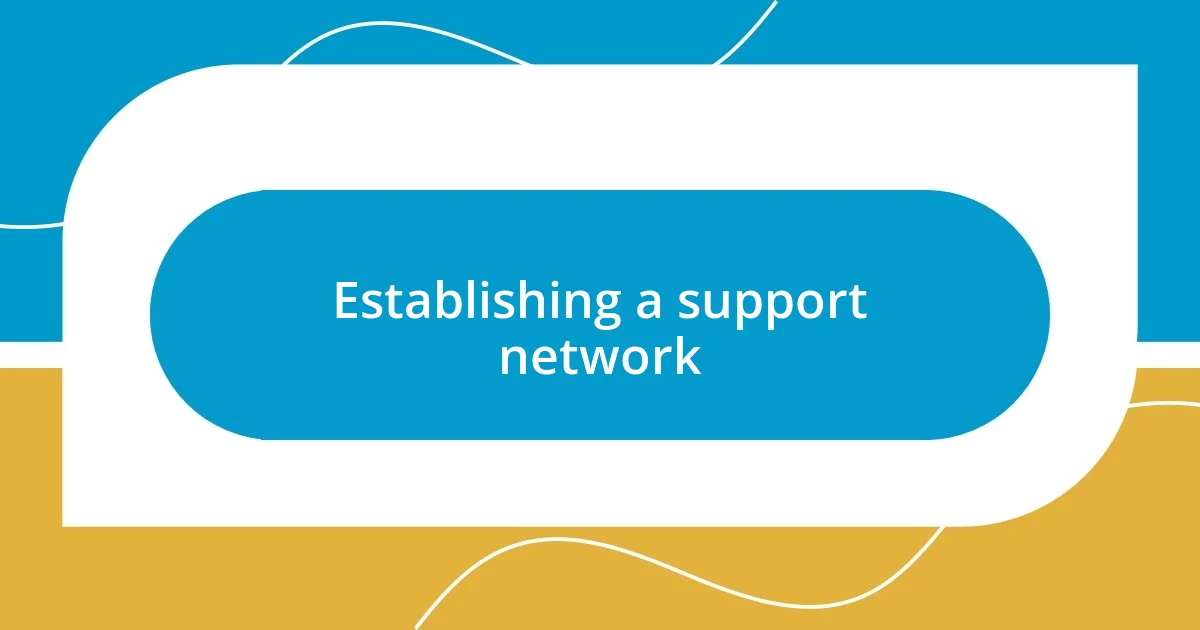
Establishing a support network
When it comes to establishing a support network, I’ve realized that it’s key to surround myself with people who genuinely understand the pressures of post-production. I remember a late-night call to a fellow editor after a frustrating day; just sharing my experiences helped lighten my load. Have you ever felt that catharsis when someone simply listens? It’s like letting out a breath I didn’t know I was holding.
I’ve also found that engaging in regular check-ins with colleagues keeps the sense of camaraderie alive. A simple group chat for sharing challenges and celebrating small wins has been invaluable. During production phases, I often share a quick motivational quote or a funny meme that brings laughter to our stressful days. It fosters a sense of belonging—doesn’t it feel great to know you’re not alone in this chaotic journey?
Moreover, I’ve cultivated relationships with mentors who have walked this path before me. Their insights have been transformative. Once, after a particularly challenging project, a mentor shared their own burnout story, emphasizing the importance of self-compassion. Hearing that advice brought me solace and reminded me that even the seasoned pros face struggles. How often do we allow ourselves that grace? Establishing a network that nurtures open dialogue and support has truly been the bedrock of managing my post-production stress.
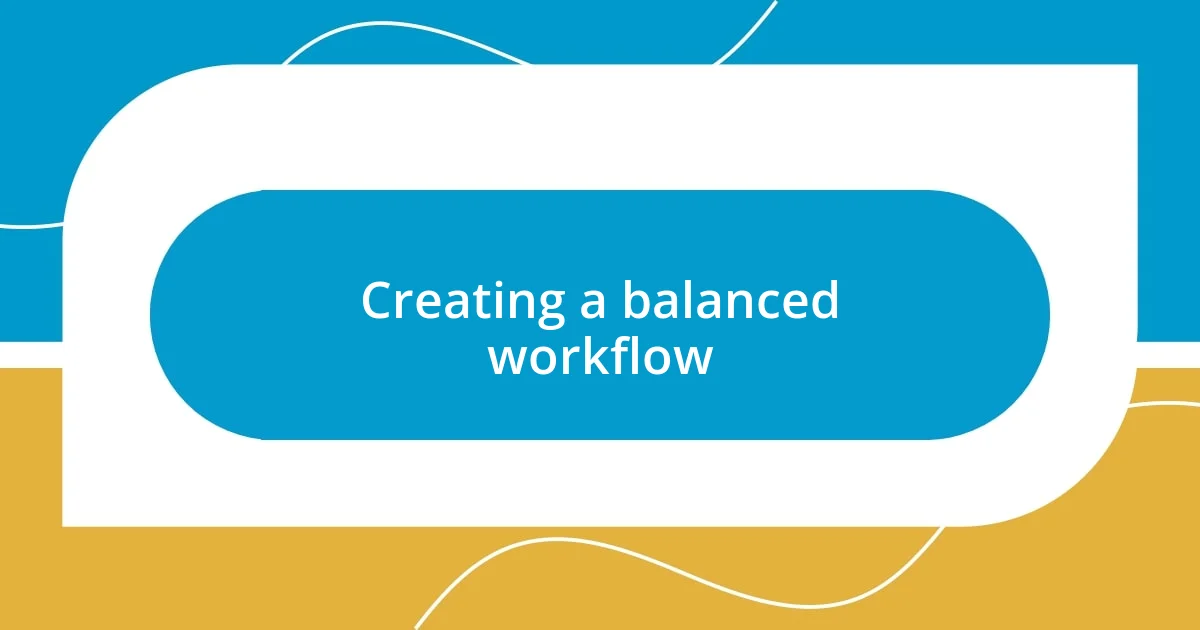
Creating a balanced workflow
Creating a balanced workflow has become essential for me in managing the whirlwind of post-production stress. I’ve learned the hard way that attempting to juggle multiple projects without prioritizing tasks leads to burnout. Just recently, I faced a looming deadline while simultaneously handling revisions for another project. It was a recipe for chaos! To regain my balance, I began prioritizing tasks based on urgency and complexity, allowing me to focus on one thing at a time. Ever tried making a task list and checking things off? It’s surprisingly satisfying and keeps the mind clear.
I also recognize the value of setting boundaries within my workflow. There was a time when I’d work endless hours, thinking it would increase my productivity. What I discovered, however, was that working yourself too hard leads to diminishing returns. Choosing to implement a strict “no work” hour in my schedule dramatically shifted my perspective. I find that stepping away and indulging in creative hobbies, like painting or hiking, actually reinvigorates my focus. How often do we forget that rest is just as crucial as work? Consistently respecting those boundaries keeps my energy levels higher, making me more efficient when I’m on the clock.
Lastly, I’m a firm believer in the power of scheduling breaks into my workflow. Initially, taking breaks felt counterproductive, especially during tight deadlines. However, I recollect a particularly intense editing session where I forced myself to break every hour for just a few minutes. Those short stretches away from my screen allowed my brain to reset, leading to sharper insights and better decision-making. Have you experienced the clarity that comes after a little time out? I can’t stress enough how these moments of pause can transform fatigue into fresh motivation, making a balanced workflow not just possible, but enjoyable.
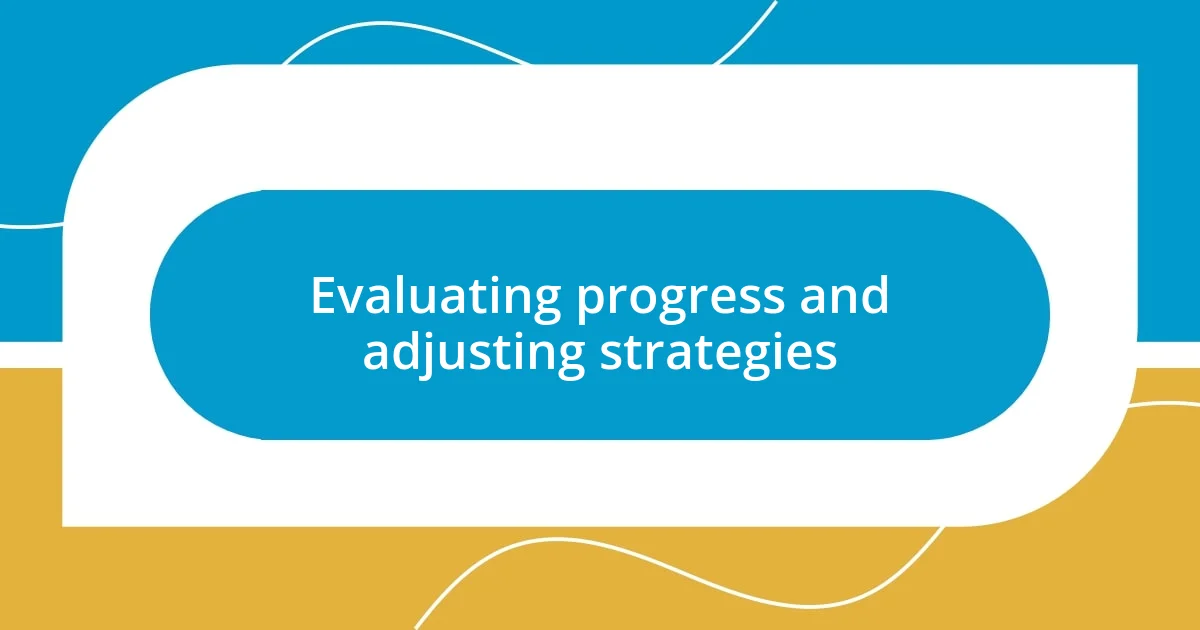
Evaluating progress and adjusting strategies
Evaluating progress has been a game changer for me in managing post-production stress. I used to overlook this critical step, thinking it was a luxury rather than a necessity. But let me tell you, reflecting on what works and what doesn’t can really illuminate a path forward. Just last month, after wrapping a project, I took a quiet evening to sift through my notes and recognize which strategies truly helped ease my workload. Have you ever had one of those enlightening realizations that made you rethink your approach? It was eye-opening to see how far I’d come and what adjustments I needed to embrace.
Adjusting strategies often involves a bit of trial and error. For instance, I experimented with a new organization tool designed for project management. At first, I felt overwhelmed with its features, but after sticking with it for a few weeks and refining my usage, I began to see improvements. I wonder, how many times have we modified our habits only to discover a goldmine of efficiency? The key is to remain flexible and open-minded about what might serve us better. Reflecting on those changes has propelled me to adapt continually, keeping the stress levels manageable.
Incorporating feedback from my team has also been pivotal. I recall an instance where my colleagues mentioned how my editing pace was leading to tension. Instead of brushing off their opinions, I took them to heart and revised how I communicated deadlines and expectations. It was a turning point—by valuing those insights, we created a more supportive environment. After all, isn’t it essential to foster a dynamic where everyone’s voice matters? Engaging in this evaluative process has transformed my approach, proving that sometimes, the best adjustments are made through collaboration.
